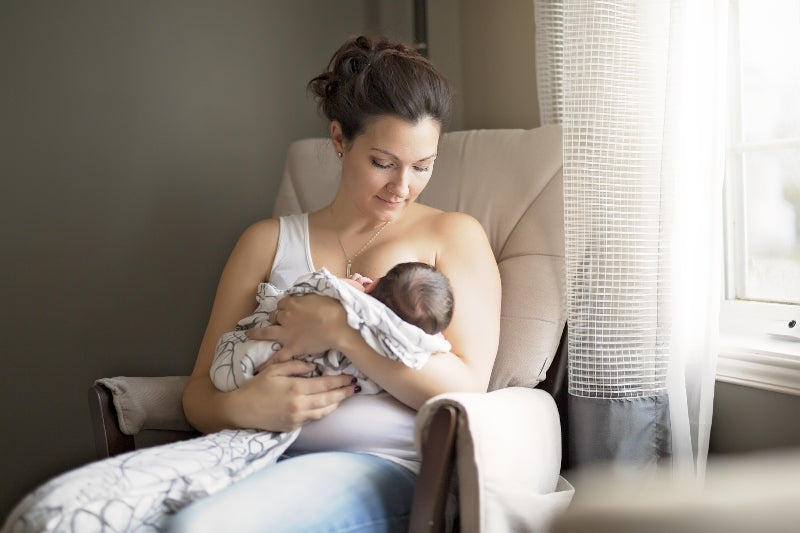" How to provide relief for your baby "
All of a sudden and as if out of the blue, your baby starts crying after feeding. It constantly pulls up its little legs and little tears roll down its cheeks. It is particularly difficult for any parent to see their child suffering like this. Such cramps often hide the dreaded 3-month colic. Flatulence, which is very difficult for the little ones. However, you are not completely helpless in the face of 3-month colic. There are, of course, a few old household remedies that promise some relief from discomfort. These include a heating pad, as the heat has a cramp-relieving effect and therefore provides rapid relief. In addition, fennel tea is also a cure-all if your little one is pinching.
What is 3-month colic and how does it develop?
This special form of flatulence describes cramp-like and severe pain that primarily occurs in the abdominal area. Some babies are particularly affected in the first three months of life. This is where the term "3-month colic" comes from. The pain usually occurs immediately after meals. However, the true causes have not yet been clearly identified. Some research assumes that intestinal activity is either too slow and therefore more digestive gases form and accumulate. Or the bowel works too quickly and therefore cramps.

The pain usually occurs immediately after meals
You must also bear in mind that the change in diet after birth is difficult. Whether breast milk or infant formula - the intestines first have to learn how to deal with the new nutrients. However, it has been proven that breastfed children suffer less from the dreaded flatulence than bottle-fed children. If you are unable to breastfeed, use bottles for your baby's milk that allow air to be exchanged. This means that much less air gets into the tummy and additional flatulence is prevented.
Ultimately, it is probably a mixture of all possible causes that lead to 3-month colic.
The term 3-month colic is often associated with a crying baby. However, a clear distinction needs to be made here. Such complaints can also occur in adults and originate in the digestive system. A cry baby, on the other hand, not only suffers from colic, but is also unable to cope with the overload of stimuli. Every new impression is processed and sometimes there are far too many in one day, so that the little ones simply see no way out and cry. Always remember that your child is not shouting at you or trying to annoy you with their loud crying. It is a cry for help.
Why is the baby crying more and more?
Once the 3-month colic has struck, a cycle begins that demands everything from you as parents and also from the child. Due to the excessive and persistent crying, your little one naturally swallows a lot of air. This, in turn, leads to the formation of new gas and the discomfort can become even worse.

Soothe your baby
It is now up to you to make sure that your baby calms down. Of course, this is often easier said than done. Nevertheless, it is important that you try to keep calm.
What helps with baby flatulence?
Warmth is by far the best aid. A heat pad provides quick relief and can be used at any time. Place the pillow in a microwave or oven and heat it up according to the enclosed instructions. Before placing the cushion on your stomach, be sure to check the temperature again. The best way to do this is to place it on your wrist. You can gauge the temperature very well there. If it is pleasantly warm and not hot, it is ideal.
Do not despair if the effect is not immediate. It takes time for the heat to take effect. It is recommended that you have at least two heat pads in your household. This way, you can still react in an emergency if something goes wrong with a cushion or it accidentally breaks. To be on the safe side, keep an extra heating pad with grandma and grandpa if you visit them often.


A little gift idea: a cushion cover with the name of your little sunshine or a cute motif on it gives the warming cushion a personal touch. In addition to the cozy warming pillow, you can also offer a fennel tea. This also helps to reduce flatulence and soothes the little tummy very well.
A warm bath
If your little one has calmed down a little but is still in pain, you can of course also run a little bath. The cozy warmth of the water has a double effect. Babies feel particularly safe in water in the first few weeks. After all, you have also spent the past nine months in nice, consistently warm water.

A warm bath for relaxation
Place your baby in the bath and gently massage their tummy with a soft terry cloth washcloth. You will notice that your baby slowly relaxes. Do not prolong the bath too much. Dry your baby off with the hooded towel and put him in his crib, freshly changed.
A cuddly toy and turn on the music box and your little one will feel much more at ease. He will certainly be very tired and exhausted.
Can colic be avoided?
Many mothers rightly ask themselves whether they can avoid 3-month colic in any way. Yes and no. If you are breastfeeding your child, it is important to pay attention to the foods you eat. Similar to an adult, certain foods will cause your baby to be bloated. You should therefore avoid vegetables that can cause bloating while breastfeeding. These clearly include onions, cabbage, beans and pulses. You know best, of course. If you know which delicacies make your tummy twitch, then you should of course also avoid them for the time being.

For all mothers who give their baby a bottle, it is important to pay attention to the type of bottle. There are now teat bottles that are designed in such a way that they hardly let in any air when drinking. Flatulence can occur during the first three months, but does not have to. On average, 20 percent of babies suffer from 3-month colic in the first few weeks. Fortunately, as surprisingly as they appear, they also disappear again.
Experts believe that after this time, the digestive system in the child's body has developed and adapted to such an extent that the painful cramps no longer occur. With a heating pad, some fennel tea and a nice warm bath, you can play a small part in helping your child get over this time.














